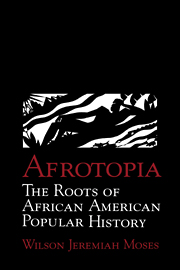Book contents
- Frontmatter
- Contents
- Acknowledgments
- Dedication
- 1 Introduction
- 2 Varieties of Black Historicism
- 3 From Superman to Man
- 4 Progress, Providence, and Civilizationism
- 5 W. E. B. Du Bois and Antimodernism
- 6 Afrocentrism, Cosmopolitanism, and Cultural Literacy in the American Negro Academy
- 7 Caliban's Utopia
- 8 Barbarism Grafted onto Decadence
- 9 Conclusion
- Notes
- Index
5 - W. E. B. Du Bois and Antimodernism
Published online by Cambridge University Press: 10 November 2009
- Frontmatter
- Contents
- Acknowledgments
- Dedication
- 1 Introduction
- 2 Varieties of Black Historicism
- 3 From Superman to Man
- 4 Progress, Providence, and Civilizationism
- 5 W. E. B. Du Bois and Antimodernism
- 6 Afrocentrism, Cosmopolitanism, and Cultural Literacy in the American Negro Academy
- 7 Caliban's Utopia
- 8 Barbarism Grafted onto Decadence
- 9 Conclusion
- Notes
- Index
Summary
SECTION I: ARMINIANISM, ANTINOMIANISM, AND AFRICANITY IN RELIGION
“A foolish consistency,” says Ralph Waldo Emerson, “is the hobgoblin of little minds.” Complexity of thought may, conversely, be the mark of a spacious mind, and it is in this spirit that I allude, over the course of this and the next chapter, to the complicated and endlessly inventive thinking of W. E. B. Du Bois. Preeminently a dialectician, he frequently championed apparently opposing positions, sometimes within the scope of a single paragraph. Thus, he could be a spirited advocate of Pan-Africanism, while insisting that African peoples were members of a world community centered in universal values. He could defend African Americans' institutional separatism, while crusading relentlessly for their citizenship rights. He could propose an open and inclusive American society, and still oppose the radical integrationism of Walter White and Thurgood Marshall, who argued that segregation inherently implied inequality. His selective advocacy of separatism led to his eventual rupture with Walter White and the other leadership of the National Association for the Advancement of Colored People (NAACP).
In his 1940 publication Dusk of Dawn, Du Bois conceded that Booker T. Washington's emphasis on separate institutional development had always contained elements of validity. Discovery of this fact often surprises those who have not read Du Boise's earlier writings with care. Du Bois had never pledged himself to institutional assimilation, and in his later years he seemed to recognize a similarity between his own ideas and the Stalinist agenda of multinationality within an American union.
- Type
- Chapter
- Information
- AfrotopiaThe Roots of African American Popular History, pp. 136 - 168Publisher: Cambridge University PressPrint publication year: 1998
- 2
- Cited by

